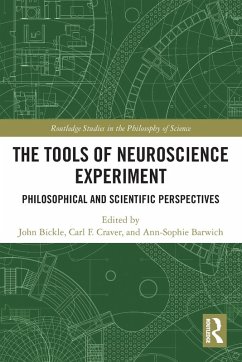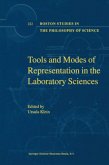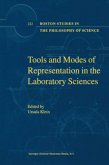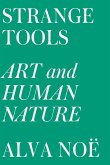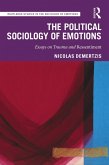The Tools of Neuroscience Experiment
Philosophical and Scientific Perspectives
Herausgeber: Bickle, John; Barwich, Ann-Sophie; Craver, Carl F.
The Tools of Neuroscience Experiment
Philosophical and Scientific Perspectives
Herausgeber: Bickle, John; Barwich, Ann-Sophie; Craver, Carl F.
- Broschiertes Buch
- Merkliste
- Auf die Merkliste
- Bewerten Bewerten
- Teilen
- Produkt teilen
- Produkterinnerung
- Produkterinnerung
This volume establishes the conceptual foundation for sustained investigation into tool development in neuroscience. Neuroscience relies on diverse and sophisticated experimental tools, and its ultimate explanatory target catapults the investigation of these research tools into a philosophical spotlight.
Andere Kunden interessierten sich auch für
![Tools and Modes of Representation in the Laboratory Sciences Tools and Modes of Representation in the Laboratory Sciences]() U. Klein (ed.)Tools and Modes of Representation in the Laboratory Sciences77,99 €
U. Klein (ed.)Tools and Modes of Representation in the Laboratory Sciences77,99 €![Tools and Modes of Representation in the Laboratory Sciences Tools and Modes of Representation in the Laboratory Sciences]() Tools and Modes of Representation in the Laboratory Sciences75,99 €
Tools and Modes of Representation in the Laboratory Sciences75,99 €![Strange Tools Strange Tools]() Alva NoëStrange Tools18,99 €
Alva NoëStrange Tools18,99 €![Tools for Young Philosophers Tools for Young Philosophers]() Paul Timothy JensenTools for Young Philosophers20,99 €
Paul Timothy JensenTools for Young Philosophers20,99 €![Tools for Young Philosophers Tools for Young Philosophers]() Paul Timothy JensenTools for Young Philosophers31,99 €
Paul Timothy JensenTools for Young Philosophers31,99 €![The Foundations of Spacetime Physics The Foundations of Spacetime Physics]() The Foundations of Spacetime Physics180,99 €
The Foundations of Spacetime Physics180,99 €![The Political Sociology of Emotions The Political Sociology of Emotions]() Nicolas DemertzisThe Political Sociology of Emotions184,99 €
Nicolas DemertzisThe Political Sociology of Emotions184,99 €-
-
-
This volume establishes the conceptual foundation for sustained investigation into tool development in neuroscience. Neuroscience relies on diverse and sophisticated experimental tools, and its ultimate explanatory target catapults the investigation of these research tools into a philosophical spotlight.
Produktdetails
- Produktdetails
- Verlag: Routledge
- Seitenzahl: 364
- Erscheinungstermin: 27. Mai 2024
- Englisch
- Abmessung: 229mm x 152mm x 20mm
- Gewicht: 527g
- ISBN-13: 9781032170114
- ISBN-10: 1032170115
- Artikelnr.: 70352029
- Herstellerkennzeichnung
- Libri GmbH
- Europaallee 1
- 36244 Bad Hersfeld
- gpsr@libri.de
- Verlag: Routledge
- Seitenzahl: 364
- Erscheinungstermin: 27. Mai 2024
- Englisch
- Abmessung: 229mm x 152mm x 20mm
- Gewicht: 527g
- ISBN-13: 9781032170114
- ISBN-10: 1032170115
- Artikelnr.: 70352029
- Herstellerkennzeichnung
- Libri GmbH
- Europaallee 1
- 36244 Bad Hersfeld
- gpsr@libri.de
John Bickle is Professor of Philosophy and Shackouls Honors College Faculty at Mississippi State University and Affiliated Faculty in the Department of Neurobiology and Anatomical Sciences at the University of Mississippi Medical Center. He is author of four academic books and editor of The Oxford Handbook of Philosophy and Neuroscience (2009). Carl F. Craver is a Professor in the Philosophy Department and the Philosophy-Neuroscience-Psychology Program at Washington University in St. Louis. He specializes in the Philosophy of Science and has continuing research activity in the neuropsychology of memory. He is the author of Explaining the Brain: Mechanisms and the Mosaic Unity of Neuroscience and (with Lindley Darden) In Search of Mechanisms: Discoveries across the Life Sciences. Ann-Sophie Barwich is Assistant Professor at Indiana University Bloomington (Department of History and Philosophy of Science and Medicine; Cognitive Science). She specializes in olfaction as a model for theories of mind and brain. Barwich is the author of Smellosophy: What the Nose Tells the Mind (2020).
Foreword
Stuart Firestein
Editors' Introduction
John Bickle, Carl F. Craver and Ann-Sophie Barwich
Section I: Research Tools in Relation to Theories
1. Tinkering in the Lab
John Bickle
2. Tools, experiments and theories: An examination of the role of
experiment tools
Gregory Johnson
3. Science in practice in neuroscience: The Cincinnati water maze in the
making
Nina A. Atanasova, Michael T. Williams and Charles V. Voorhees
4. Where molecular science meets perfumery: A behind-the-scenes look at
SCAPE microscopy and its theoretical impact on current olfaction
Ann-Sophie Barwich and Lu Xu
5. A different role for tinkering: Brain fog, COVID-19, and the accidental
nature of Neurobiological Theory Development
Valerie Gray Hardcastle and C. Matthew Stewart
Section II: Research Tools and Epistemology
6. Dissemination and adaptiveness as key variables in tools that fuel
scientific revolutions
Alcino J. Silva
7. Towards an epistemology of intervention: Optogenetics and maker's
knowledge
Carl F. Craver
8. Triangulating tools in the messiness of cognitive neuroscience
Antonella Tramacere
9. Prediction, explanation and the "toolbox" problem
Marco J. Nathan
Section III: Research Tools, Integration, Circuits and Ontology
10. How do tools obstruct (and facilitate) integration in neuroscience?
David J. Colaço
11. Understanding brain circuits: do new experimental tools need to address
new concepts?
David Parker
12. Cognitive ontologies, task ontologies and explanation in cognitive
neuroscience
Daniel Burnston
Section IV: Tools and Integrative Pluralism
13. "It takes two to make a thing go right": The coevolution of
technological and mathematical tools in neuroscience
Luis Favela
14. Hybrid brains: Interfacing living neurons and circuits with
computational models
Astrid Prinz
Section V: Tool Use and Development Beyond Neuroscience
15. Beyond actual difference making: Causal selections in genetics
Janella Baxter
Stuart Firestein
Editors' Introduction
John Bickle, Carl F. Craver and Ann-Sophie Barwich
Section I: Research Tools in Relation to Theories
1. Tinkering in the Lab
John Bickle
2. Tools, experiments and theories: An examination of the role of
experiment tools
Gregory Johnson
3. Science in practice in neuroscience: The Cincinnati water maze in the
making
Nina A. Atanasova, Michael T. Williams and Charles V. Voorhees
4. Where molecular science meets perfumery: A behind-the-scenes look at
SCAPE microscopy and its theoretical impact on current olfaction
Ann-Sophie Barwich and Lu Xu
5. A different role for tinkering: Brain fog, COVID-19, and the accidental
nature of Neurobiological Theory Development
Valerie Gray Hardcastle and C. Matthew Stewart
Section II: Research Tools and Epistemology
6. Dissemination and adaptiveness as key variables in tools that fuel
scientific revolutions
Alcino J. Silva
7. Towards an epistemology of intervention: Optogenetics and maker's
knowledge
Carl F. Craver
8. Triangulating tools in the messiness of cognitive neuroscience
Antonella Tramacere
9. Prediction, explanation and the "toolbox" problem
Marco J. Nathan
Section III: Research Tools, Integration, Circuits and Ontology
10. How do tools obstruct (and facilitate) integration in neuroscience?
David J. Colaço
11. Understanding brain circuits: do new experimental tools need to address
new concepts?
David Parker
12. Cognitive ontologies, task ontologies and explanation in cognitive
neuroscience
Daniel Burnston
Section IV: Tools and Integrative Pluralism
13. "It takes two to make a thing go right": The coevolution of
technological and mathematical tools in neuroscience
Luis Favela
14. Hybrid brains: Interfacing living neurons and circuits with
computational models
Astrid Prinz
Section V: Tool Use and Development Beyond Neuroscience
15. Beyond actual difference making: Causal selections in genetics
Janella Baxter
Foreword
Stuart Firestein
Editors' Introduction
John Bickle, Carl F. Craver and Ann-Sophie Barwich
Section I: Research Tools in Relation to Theories
1. Tinkering in the Lab
John Bickle
2. Tools, experiments and theories: An examination of the role of
experiment tools
Gregory Johnson
3. Science in practice in neuroscience: The Cincinnati water maze in the
making
Nina A. Atanasova, Michael T. Williams and Charles V. Voorhees
4. Where molecular science meets perfumery: A behind-the-scenes look at
SCAPE microscopy and its theoretical impact on current olfaction
Ann-Sophie Barwich and Lu Xu
5. A different role for tinkering: Brain fog, COVID-19, and the accidental
nature of Neurobiological Theory Development
Valerie Gray Hardcastle and C. Matthew Stewart
Section II: Research Tools and Epistemology
6. Dissemination and adaptiveness as key variables in tools that fuel
scientific revolutions
Alcino J. Silva
7. Towards an epistemology of intervention: Optogenetics and maker's
knowledge
Carl F. Craver
8. Triangulating tools in the messiness of cognitive neuroscience
Antonella Tramacere
9. Prediction, explanation and the "toolbox" problem
Marco J. Nathan
Section III: Research Tools, Integration, Circuits and Ontology
10. How do tools obstruct (and facilitate) integration in neuroscience?
David J. Colaço
11. Understanding brain circuits: do new experimental tools need to address
new concepts?
David Parker
12. Cognitive ontologies, task ontologies and explanation in cognitive
neuroscience
Daniel Burnston
Section IV: Tools and Integrative Pluralism
13. "It takes two to make a thing go right": The coevolution of
technological and mathematical tools in neuroscience
Luis Favela
14. Hybrid brains: Interfacing living neurons and circuits with
computational models
Astrid Prinz
Section V: Tool Use and Development Beyond Neuroscience
15. Beyond actual difference making: Causal selections in genetics
Janella Baxter
Stuart Firestein
Editors' Introduction
John Bickle, Carl F. Craver and Ann-Sophie Barwich
Section I: Research Tools in Relation to Theories
1. Tinkering in the Lab
John Bickle
2. Tools, experiments and theories: An examination of the role of
experiment tools
Gregory Johnson
3. Science in practice in neuroscience: The Cincinnati water maze in the
making
Nina A. Atanasova, Michael T. Williams and Charles V. Voorhees
4. Where molecular science meets perfumery: A behind-the-scenes look at
SCAPE microscopy and its theoretical impact on current olfaction
Ann-Sophie Barwich and Lu Xu
5. A different role for tinkering: Brain fog, COVID-19, and the accidental
nature of Neurobiological Theory Development
Valerie Gray Hardcastle and C. Matthew Stewart
Section II: Research Tools and Epistemology
6. Dissemination and adaptiveness as key variables in tools that fuel
scientific revolutions
Alcino J. Silva
7. Towards an epistemology of intervention: Optogenetics and maker's
knowledge
Carl F. Craver
8. Triangulating tools in the messiness of cognitive neuroscience
Antonella Tramacere
9. Prediction, explanation and the "toolbox" problem
Marco J. Nathan
Section III: Research Tools, Integration, Circuits and Ontology
10. How do tools obstruct (and facilitate) integration in neuroscience?
David J. Colaço
11. Understanding brain circuits: do new experimental tools need to address
new concepts?
David Parker
12. Cognitive ontologies, task ontologies and explanation in cognitive
neuroscience
Daniel Burnston
Section IV: Tools and Integrative Pluralism
13. "It takes two to make a thing go right": The coevolution of
technological and mathematical tools in neuroscience
Luis Favela
14. Hybrid brains: Interfacing living neurons and circuits with
computational models
Astrid Prinz
Section V: Tool Use and Development Beyond Neuroscience
15. Beyond actual difference making: Causal selections in genetics
Janella Baxter

